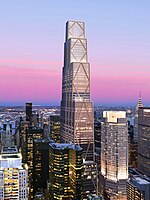JPMorgan Chase
JPMorgan Chase & Co. is an American multinational financial institution headquartered in New York City and incorporated in Delaware. It is the largest bank in the United States and the world's largest bank by market capitalization as of 2023.[4][5] As the largest of Big Four banks, the firm is considered systemically important by the Financial Stability Board. Its size and scale have often led to enhanced regulatory oversight as well as the maintenance of an internal "Fortress Balance Sheet".[6][7] The firm is headquartered at 383 Madison Avenue in Midtown Manhattan and is set to move into the under-construction JPMorgan Chase Building at 270 Park Avenue in 2025.
This article is about the current company. For its predecessor, see J.P. Morgan & Co. For its subsidiary, see Chase Bank. For other uses, see J. P. Morgan (disambiguation).Company type
- Bank of the Manhattan Company (founded 1799)
- Chemical Bank (founded 1824)
- J.P. Morgan & Co. (founded 1871)
- Chase National Bank (founded 1877)
December 1, 2000
383 Madison Avenue
New York, NY 10017
U.S.
Worldwide
- Jamie Dimon (Chairman & CEO)
- Daniel E. Pinto (President & COO)
![]() US$158.1 billion (2023)
US$158.1 billion (2023)
![]() US$49.55 billion (2023)
US$49.55 billion (2023)
![]() US$3.422 trillion (2023)
US$3.422 trillion (2023)
![]() US$3.875 trillion (2023)
US$3.875 trillion (2023)
![]() US$327.9 billion (2023)
US$327.9 billion (2023)
309,926 (2023)
- Asset and Wealth Management
- Consumer and Community Banking
- Commercial Banking
- Corporate and Investment Banking
Tier 1 16.6% (2023)
The firm's early history can be traced to 1799, with the founding of what became the Chase Manhattan Company. In 1871, J.P. Morgan & Co. was founded by J. P. Morgan who launched the House of Morgan on 23 Wall Street as a national purveyor of commercial, investment, and private banking services. The present company was formed after the two predecessor firms merged in 2000, creating a diversified holding entity. It is a major provider of investment banking services, through corporate advisory, mergers and acquisitions, sales and trading, and public offerings. Their private banking franchise and asset management division are among the world's largest in terms of total assets. Its retail banking and credit card offerings are provided via the Chase brand in the U.S. and United Kingdom.
With US$3.9 trillion in total assets,[8] JPMorgan Chase is the fifth-largest bank in the world by assets. The firm operates the largest investment bank in the world by revenue.[9][10] It occupies 24th place on the Fortune 500 list of the largest U.S. corporations by revenue. In 2023, JPMorgan Chase was ranked #1 in the Forbes Global 2000 ranking.[11] It receives routine criticism for its risk management, broad financing activities, and large-scale legal settlements.
Political contributions[edit]
JPMorgan Chase's PAC and its employees contributed $2.6 million to federal campaigns in 2014 and financed its lobbying team with $4.7 million in the first three-quarters of 2014. JPMorgan's giving has been focused on Republicans, with 62 percent of its donations going to GOP recipients in 2014. 78 House Democrats received campaign cash from JPMorgan's PAC in the 2014 cycle at an average of $5,200 and a total of 38 of the Democrats who voted for the 2015 spending bill took money from JPMorgan's PAC in 2014. JPMorgan Chase's PAC made maximum donations to the Democratic Congressional Campaign Committee and the leadership PACs of Steny Hoyer and Jim Himes in 2014.[191]
Climate change[edit]
JPMorgan has come under criticism for investing in new fossil fuels projects since the Paris climate change agreement. From 2016 to the first half of 2019 it provided $75 billion (£61 billion) to companies expanding in sectors such as fracking and Arctic oil and gas exploration.[192] According to Rainforest Action Network its total fossil fuel financing was $64 billion in 2018, $69 billion in 2017 and $62 billion in 2016.[193] From 2015, which is when the Paris Agreement was adopted, until 2021, JP Morgan Chase provided $317 billion in fossil fuel financing; 33% more than any other bank.[194] On October 21, 2021, JP Morgan Chase joined the Net-Zero Banking Alliance,[195] which supports "the global transition of the real economy to net-zero emissions."[196]
An internal study, 'Risky business: the climate and macroeconomy', by bank economists David Mackie and Jessica Murray was leaked in early‑2020. The report, dated 14 January 2020, states that under our current unsustainable trajectory of climate change "we cannot rule out catastrophic outcomes where human life as we know it is threatened". JPMorgan subsequently distanced itself from the content of the study.[197]
In May 2023, JPMorgan Chase announced that it would purchase $200 million in carbon credits representing 800,000 metric tons of carbon dioxide removal (CDR) from multiple companies (including Climeworks and Charm Industrial) after announcing the previous month that it would join the Frontier CDR initiative formed by Alphabet Inc., McKinsey & Company, Meta Platforms, Shopify, and Stripe, Inc. under a $925 million advance market commitment to the CDR industry the previous year.[list 1]
JPMorgan Chase is mainly owned by institutional investors, with over 70% of shares held. The 10 largest shareholder of the bank in December 2023 were:[234]










